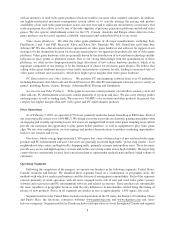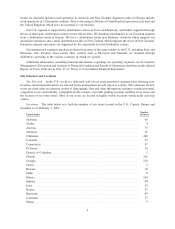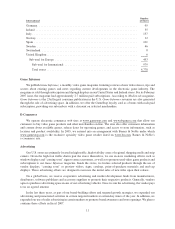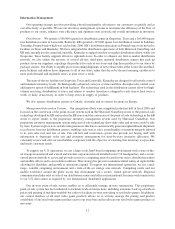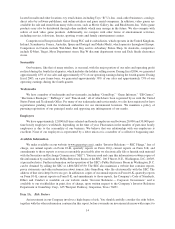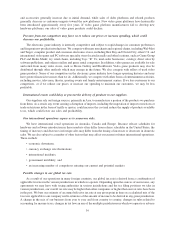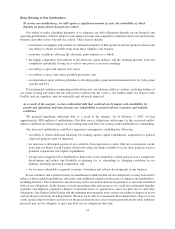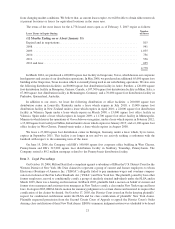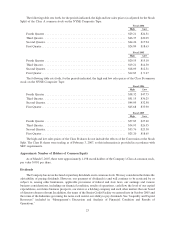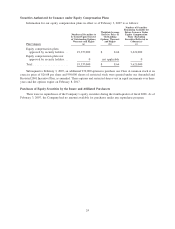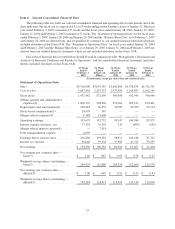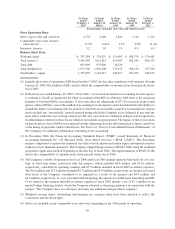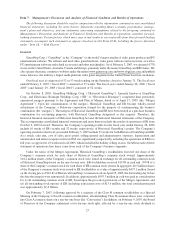GameStop 2006 Annual Report Download - page 33
Download and view the complete annual report
Please find page 33 of the 2006 GameStop annual report below. You can navigate through the pages in the report by either clicking on the pages listed below, or by using the keyword search tool below to find specific information within the annual report.new stores and operate them profitably depends upon a number of factors, some of which may be beyond our
control. These factors include:
• the ability to identify new store locations, negotiate suitable leases and build out the stores in a timely and
cost efficient manner;
• the ability to hire and train skilled associates;
• the ability to integrate new stores into our existing operations; and
• the ability to increase sales at new store locations.
Our growth will also depend on our ability to process increased merchandise volume resulting from new store
openings through our inventory management systems and distribution facilities in a timely manner. If we fail to
manage new store openings in a timely and cost efficient manner, our growth may decrease.
If our management information systems fail to perform or are inadequate, our ability to manage our
business could be disrupted.
We rely on computerized inventory and management systems to coordinate and manage the activities in our
distribution centers, as well as to communicate distribution information to the off-site, third-party operated
distribution centers with which we work. The third-party distribution centers pick up products from our suppliers,
repackage the products for each of our stores and ship those products to our stores by package carriers. We use
inventory replenishment systems to track sales and inventory. Our ability to rapidly process incoming shipments of
new release titles and deliver them to all of our stores, either that day or by the next morning, enables us to meet peak
demand and replenish stores at least twice a week, to keep our stores in stock at optimum levels and to move
inventory efficiently. If our inventory or management information systems fail to adequately perform these
functions, our business could be adversely affected. In addition, if operations in any of our distribution centers were
to shut down for a prolonged period of time or if these centers were unable to accommodate the continued store
growth in a particular region, our business could suffer.
We may engage in acquisitions which could negatively impact our business if we fail to successfully com-
plete and integrate them.
To enhance our efforts to grow and compete, we may engage in acquisitions. Our plans to pursue future
acquisitions are subject to our ability to negotiate favorable terms for these acquisitions. Accordingly, we cannot
assure you that future acquisitions will be completed. In addition, to facilitate future acquisitions, we may take
actions that could dilute the equity interests of our stockholders, increase our debt or cause us to assume contingent
liabilities, all of which may have a detrimental effect on the price of our common stock. Finally, if any acquisitions
are not successfully integrated with our business, our ongoing operations could be adversely affected.
Litigation and litigation results could negatively impact our future financial condition and results of
operation.
In the ordinary course of our business, the Company is, from time to time, subject to various litigation and legal
proceedings. In the future, the costs or results of such legal proceedings, individually or in the aggregate, could have
a negative impact on the Company’s operations or financial condition.
Legislative actions and potential new accounting pronouncements are likely to cause our general and
administrative expenses to increase and impact our future financial condition and results of operations.
In order to comply with the New York Stock Exchange listing standards and rules adopted by the SEC or other
regulatory bodies, we may be required to increase our expenditures and hire additional personnel and additional
outside legal, accounting and advisory services, all of which may cause our general and administrative costs to
increase. Changes in the accounting rules could materially increase the expenses that we report under U.S. generally
accepted accounting principles (“GAAP”) and adversely affect our operating results.
18


